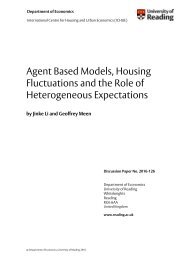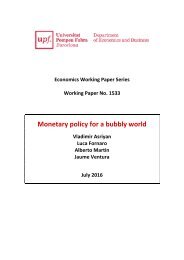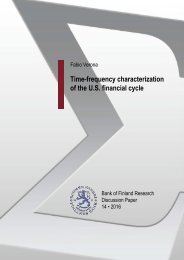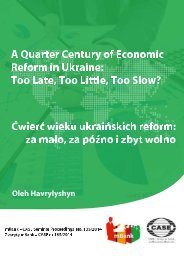Necessity as the mother of invention monetary policy after the crisis
n?u=RePEc:dnb:dnbwpp:525&r=mac
n?u=RePEc:dnb:dnbwpp:525&r=mac
Create successful ePaper yourself
Turn your PDF publications into a flip-book with our unique Google optimized e-Paper software.
might have very different concepts <strong>of</strong> what constitutes “criticism.” Ano<strong>the</strong>r explanation<br />
could be geographical differences. Our central bank heads come from all over <strong>the</strong> world,<br />
but <strong>the</strong> academics are heavily concentrated in advanced economies. However, <strong>as</strong> Table 15<br />
shows, when we restrict <strong>the</strong> sample to <strong>the</strong> advanced economies’ governors, <strong>the</strong> differences<br />
between academics and governors, though smaller, are still large and statistically<br />
significant.<br />
Table 15. How much criticism did <strong>the</strong> central bank receive?<br />
Governors Academics Chi-sq.<br />
All AEs vs. all vs. AEs<br />
CB h<strong>as</strong> received ______ criticism (NG=55, NA=159) 59.8*** 16.0***<br />
None 49.1 31.3 5.7<br />
A little 12.7 25.0 18.9<br />
A moderate amount 14.6 25.0 30.2<br />
A lot 16.4 12.5 42.1<br />
Difficult to say 7.3 6.3 3.1<br />
Notes: Figures denotes percentage <strong>of</strong> respondents. *** denotes significance at <strong>the</strong> 1% level,<br />
calculated using Chi-square tests for <strong>the</strong> independence <strong>of</strong> <strong>the</strong> responses <strong>of</strong> governors and academics.<br />
NG/NA denotes number <strong>of</strong> responding governors/academics. Source: Authors’ calculations b<strong>as</strong>ed on<br />
survey conducted in 2016.<br />
A look at Table 16 shows that <strong>the</strong> likelihood to have been criticized “a lot” is<br />
substantially larger in <strong>crisis</strong>-hit countries—hardly a surprise. The adoption <strong>of</strong><br />
unconventional <strong>monetary</strong> <strong>policy</strong> tools also matters. Our initial hypo<strong>the</strong>sis w<strong>as</strong> that<br />
embarking on QE would likely lead to more criticism, but this is only <strong>the</strong> c<strong>as</strong>e with o<strong>the</strong>r<br />
(than government debt) <strong>as</strong>sets. The only o<strong>the</strong>r instrument that we find to provoke criticism<br />
is <strong>the</strong> adoption <strong>of</strong> forward guidance.<br />
Among <strong>the</strong> academics, <strong>the</strong> only relevant determinants <strong>of</strong> criticism are <strong>the</strong> “country”<br />
fixed effects, with academics in <strong>the</strong> euro area having a 20 percentage point higher<br />
propensity to answer that <strong>the</strong>ir central bank h<strong>as</strong> received a lot <strong>of</strong> criticism than <strong>the</strong>ir U.S.<br />
peers, and academics in <strong>the</strong> “o<strong>the</strong>r” countries a 33 percentage point lower propensity (see<br />
Table A3).<br />
35








